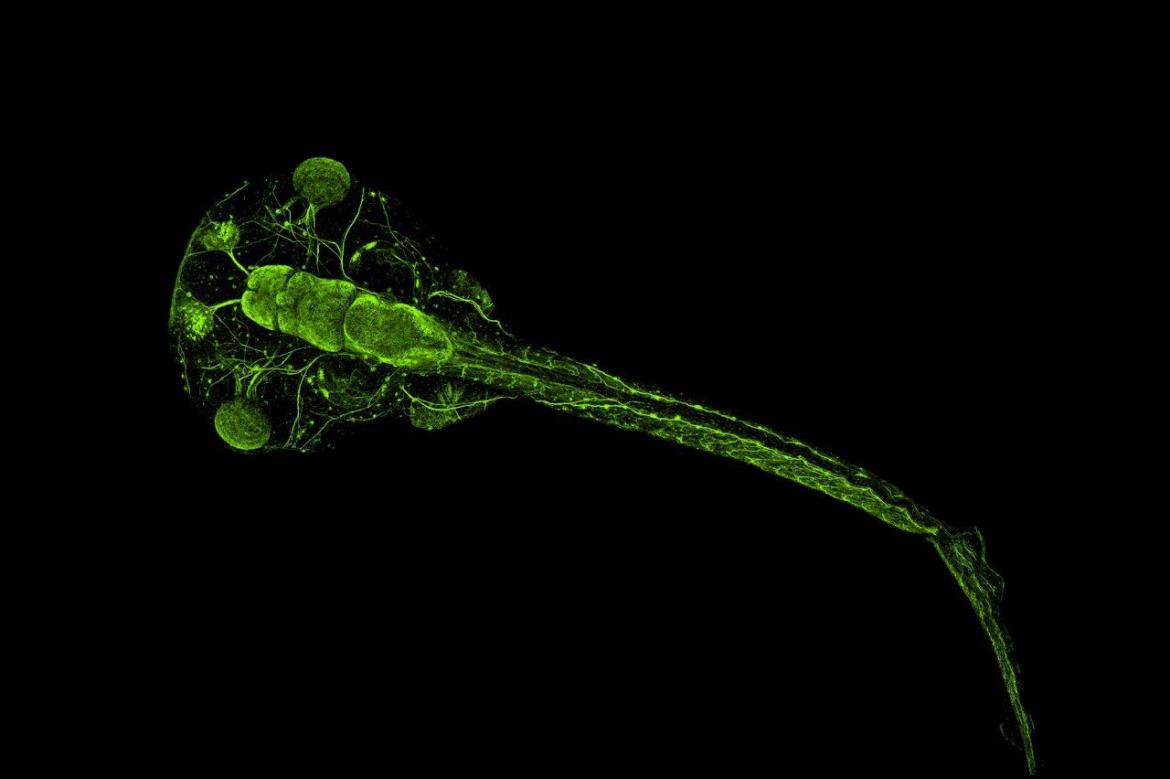By Mara Grunbaum | Excerpted from the UCSF Magazine article "Astonishing Animals That Illuminate Human Health"

[Photo: Willsey Lab]
When Helen Willsey, PhD, looks up from her lab bench, she sees frogs crawling up the walls. The larger-than-life plastic models are surrounded by frog photos, microscope images of frog brains, and a flag featuring a cartoon frog on which someone has taped a black handlebar mustache. Willsey is a postdoctoral researcher in the neurogenetics lab of Matthew State, MD, PhD, the Oberndorf Professor and chair of the Department of Psychiatry and Behavioral Sciences at the UCSF Weill Institute for Neurosciences. She works with a pudgy, speckled creature called the clawed frog to investigate how genes associated with autism affect the development of the brain.
Clawed frogs and humans have some obvious differences. People cannot, for example, survive a drought by burying themselves in mud for a year. But the clawed frog is a popular model for neurological study because their brains develop in similar stages to ours, explains Willsey. Frogs also breed quickly and enthusiastically, laying up to 4,000 embryos in an afternoon, so acquiring research specimens is easy.
Those embryos grow in a more orderly fashion than the embryos of most other organisms. After a fertilized egg divides into two identical cells, one cell will develop into the left half of a frog’s body, and the other cell will grow into the right half. Disabling a gene in just one cell at this stage lets Willsey raise a tadpole that expresses the gene in one half of its body but not the other. Comparing the two halves of the brain under a microscope reveals the effect of that gene on the brain’s development.
Willsey has found that several autism-associated genes change the size of the forebrain, which is involved in social interaction and higher thinking. But those differences would have been impossible to detect if Willsey had compared two different frogs, whose sizes vary naturally. “We can pick it up because we have this half-and-half animal,” she says. Translating such research into therapies for humans will be a long and complicated task, but promising leaps in the last few years make Willsey hopeful that the work will pay off.
Read more: Meet eight more scurrying, soaring, and slithering wonders over at UCSF Magazine.
About UCSF Psychiatry and Behavioral Sciences
The UCSF Department of Psychiatry and Behavioral Sciences and the Langley Porter Psychiatric Institute are among the nation's foremost resources in the fields of child, adolescent, adult, and geriatric mental health. Together they constitute one of the largest departments in the UCSF School of Medicine and the UCSF Weill Institute for Neurosciences, with a mission focused on research (basic, translational, clinical), teaching, patient care, and public service.
UCSF Psychiatry and Behavioral Sciences conducts its clinical, educational, and research efforts at a variety of locations in Northern California, including Langley Porter Psychiatric Hospital; UCSF Medical Centers at Parnassus Heights, Mission Bay, and Mount Zion; UCSF Benioff Children’s Hospitals in San Francisco and Oakland; Zuckerberg San Francisco General Hospital and Trauma Center; the San Francisco VA Health Care System; UCSF Fresno; and numerous community-based sites around the San Francisco Bay Area.
About the UCSF Weill Institute for Neurosciences
The UCSF Weill Institute for Neurosciences, established by the extraordinary generosity of Joan and Sanford I. "Sandy" Weill, brings together world-class researchers with top-ranked physicians to solve some of the most complex challenges in the human brain.
The UCSF Weill Institute leverages UCSF’s unrivaled bench-to-bedside excellence in the neurosciences. It unites three UCSF departments—Neurology, Psychiatry, and Neurological Surgery—that are highly esteemed for both patient care and research, as well as the Neuroscience Graduate Program, a cross-disciplinary alliance of nearly 100 UCSF faculty members from 15 basic-science departments, as well as the UCSF Institute for Neurodegenerative Diseases, a multidisciplinary research center focused on finding effective treatments for Alzheimer’s disease, frontotemporal dementia, Parkinson’s disease, and other neurodegenerative disorders.
About UCSF
The University of California, San Francisco (UCSF) is exclusively focused on the health sciences and is dedicated to promoting health worldwide through advanced biomedical research, graduate-level education in the life sciences and health professions, and excellence in patient care. UCSF Health, which serves as UCSF’s primary academic medical center, includes top-ranked specialty hospitals and other clinical programs, and has affiliations throughout the Bay Area.





